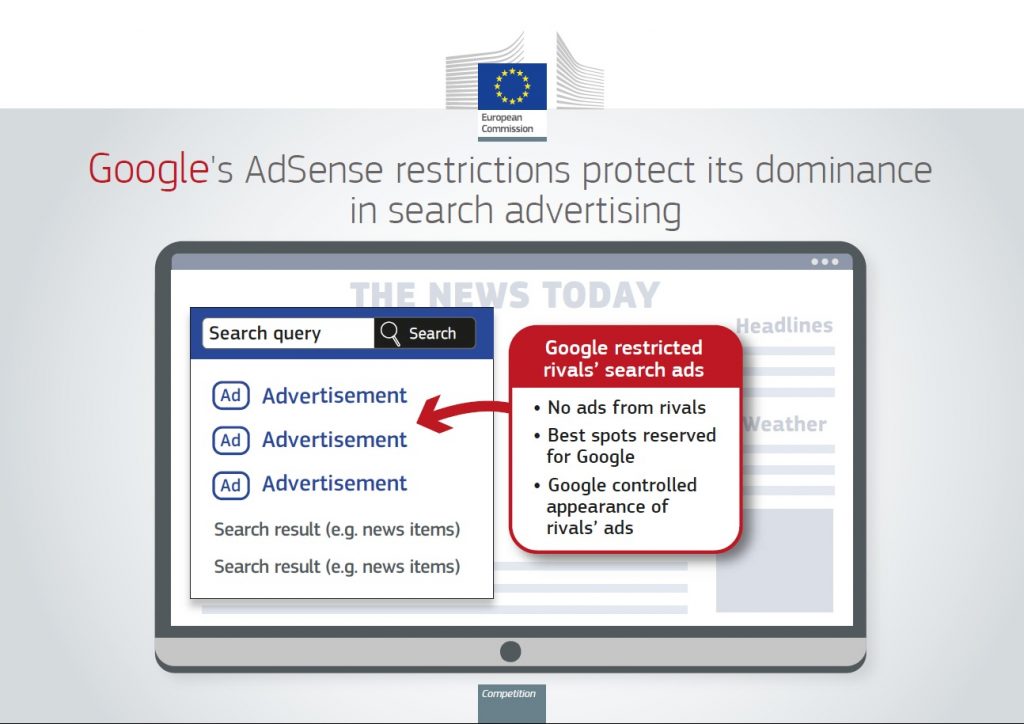 The European Commission has fined Google €1.49 billion for breaching EU antitrust rules this spring. Google has abused its market dominance by imposing a number of restrictive clauses in contracts with third-party websites which prevented Google’s rivals from placing their search adverts on these websites.
The European Commission has fined Google €1.49 billion for breaching EU antitrust rules this spring. Google has abused its market dominance by imposing a number of restrictive clauses in contracts with third-party websites which prevented Google’s rivals from placing their search adverts on these websites.
Websites such as newspaper websites, blogs or travel sites aggregators often have a search function embedded. When a user searches using this search function, the website delivers both search results and search adverts, which appear alongside the search result.
Through AdSense for Search, Google provides these search adverts to owners of “publisher” websites. Google is an intermediary, like an advertising broker, between advertisers and website owners that want to profit from the space around their search results pages. Therefore, AdSense for Search works as an online search advertising intermediation platform.
Google was by far the strongest player in online search advertising intermediation in the European Economic Area (EEA), with a market share above 70% from 2006 to 2016. In 2016 Google also held market shares generally above 90% in the national markets for general search and above 75% in most of the national markets for online search advertising, where it is present with its flagship product, the Google search engine, which provides search results to consumers.
It is not possible for competitors in online search advertising such as Microsoft and Yahoo to sell advertising space in Google’s own search engine results pages. Therefore, third-party websites represent an important entry point for these other suppliers of online search advertising intermediation services to grow their business and try to compete with Google.
Google’s provision of online search advertising intermediation services to the most commercially important publishers took place via agreements that were individually negotiated. The Commission has reviewed hundreds of such agreements in the course of its investigation and found that:
- Starting in 2006, Google included exclusivity clauses in its contracts. This meant that publishers were prohibited from placing any search adverts from competitors on their search results pages. The decision concerns publishers whose agreements with Google required such exclusivity for all their websites.
- As of March 2009, Google gradually began replacing the exclusivity clauses with so-called “Premium Placement” clauses. These required publishers to reserve the most profitable space on their search results pages for Google’s adverts and request a minimum number of Google adverts. As a result, Google’s competitors were prevented from placing their search adverts in the most visible and clicked on parts of the websites’ search results pages.
- As of March 2009, Google also included clauses requiring publishers to seek written approval from Google before making changes to the way in which any rival adverts were displayed. This meant that Google could control how attractive, and therefore clicked on, competing search adverts could be.
Therefore, Google first imposed an exclusive supply obligation, which prevented competitors from placing any search adverts on the commercially most significant websites. Then, Google introduced what it called its “relaxed exclusivity” strategy aimed at reserving for its own search adverts the most valuable positions and at controlling competing adverts’ performance.
Google’s practices covered over half the market by turnover throughout most of the period. Google’s rivals were not able to compete on the merits, either because there was an outright prohibition for them to appear on publisher websites or because Google reserved for itself by far the most valuable commercial space on those websites, while at the same time controlling how rival search adverts could appear.
Based on a broad range of evidence, the Commission found that Google’s conduct harmed competition and consumers, and stifled innovation. Google’s rivals were unable to grow and offer alternative online search advertising intermediation services to those of Google. As a result, owners of websites had limited options for monetizing space on these websites and were forced to rely almost solely on Google. Google did not demonstrate that the clauses created any efficiencies capable of justifying its practices.
The Commission’s fine of €1 494 459 000 (1.29% of Google’s turnover in 2018) takes account of the duration and gravity of the infringement. In accordance with the Commission’s 2006 Guidelines on fines, the fine has been calculated on the basis of the value of Google’s revenue from online search advertising intermediation in the EEA. Finally, Google is also liable to face civil actions for damages that can be brought before the courts of the Member States by any person or business affected by its anti-competitive behaviour.